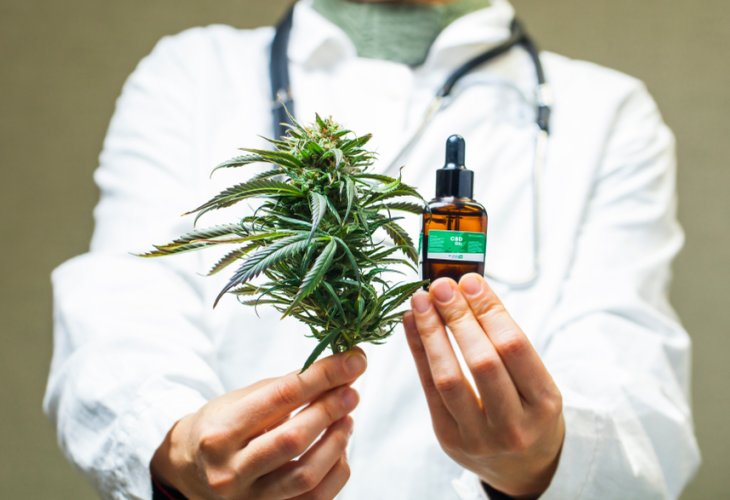Anxiety, Addiction, and Fertility Issues: Medical Cannabis – The Side Effects You Didn't Know About
Medical cannabis offers benefits for severe or chronic disease patients, but not many are aware of its side effects, ranging from physical and cognitive harm to addiction and mental health impacts. It's important to be informed.
 (Photo: shutterstock)
(Photo: shutterstock)In recent years, many patients suffering from terminal illnesses, chronic pain, and certain other medical conditions have been prescribed medical cannabis.
The use of medical cannabis has proven effective primarily for pain relief, as well as other medical purposes, like treating spasms in multiple sclerosis patients, alleviating inflammatory bowel diseases (such as Crohn's), and more. The use of medical cannabis is expanding, and there is an attempt to approve it for widespread use beyond the medical indications.
However, it is important to know that the effects of cannabis are still being researched. Many are unaware of the numerous side effects that may result from cannabis use – some even from a single use, and others from prolonged or high-quantity use. There are also side effects resulting from drug interactions, in those who use other medications for any medical needs.
What are these side effects?
Lung Damage
Medical cannabis can be consumed in various ways. Smoking the plant tends to cause damage similar to that of smoking regular cigarettes – such as throat and respiratory system inflammations, asthma, OCPD, lung cancer, and more. It should be emphasized that someone who smokes both regular cigarettes and cannabis effectively doubles the smoking-related side effects. However, it's worth noting that these damages are not caused by cannabis itself, but by smoking it. These effects can be avoided by taking the medicine in other forms, such as cannabis oil.
Decreased Alertness
The cognitive effects of cannabis can impair alertness. According to the medical use guidelines for cannabis, one should avoid driving or performing dangerous tasks of various kinds for six hours after consumption. However, it's important to know that the time active ingredients remain in the blood varies from person to person, season to season, and is also related to the cannabis dosage taken. This means that not infrequently, even after six hours from use, traces of the substance may still remain in the blood. It is crucial to know that someone who waited six hours from consumption to driving, if involved in a car accident and had a blood test taken, will be considered as having driven under the influence of drugs. The general recommendation is to completely avoid driving during the period of cannabis use.
Cannabis can also cause effects such as dizziness, imbalance, lack of coordination, slowing down of motor activity, and more.
 (Photo: shutterstock)
(Photo: shutterstock)
Medical Conditions
Using cannabis can cause hypoglycemia (low blood sugar). Diabetic patients of all types should exercise extra caution when using cannabis, monitor blood sugar levels, and eat both before and after use.
People with cardiovascular problems may experience a drop in blood pressure (and more rarely – an increase in blood pressure) and changes in heart rate after using cannabis.
Those suffering from urinary tract infections or kidney failure also need to exercise caution, as cannabis can cause vomiting, diarrhea, and disturbance in the body's electrolyte balance.
The use of cannabis can cause dryness in the eyes and oral mucosa – especially when smoked, but also in other forms of use.
Fertility Impairment
The use of medical cannabis is prohibited for pregnant and breastfeeding women. Adverse effects have been proven on babies born to mothers who smoked cannabis during pregnancy, ranging from developmental harm to cognitive delays. Additionally, the use of cannabis may harm fertility, both in women and men.
Cognitive Impairments
Cannabis use can cause cognitive effects such as impairment in attention and concentration, memory lapses, damage to organizational skills and learning abilities, as well as impairment in the ability to integrate complex information. These impairments result from the active ingredients in cannabis affecting astrocytes, leading to the breakdown of synapses in the brain.
These impairments depend on both the cannabis dosage used and the duration of its use. The higher the dosage, the greater the likelihood of cognitive impairment, and the longer the use of cannabis, the greater the likelihood that the impairments will also be long-term and irreversible.
Mental Health Effects
Statistics show that cannabis use may cause numerous mental health issues, such as severe depression, up to suicidal thoughts; anxiety and panic attacks; paranoia; auditory and visual hallucinations, and more. Cannabis use may also increase the risk of schizophrenia and similar mental disorders. At high doses, cannabis use can lead to euphoria that impairs judgment, apathy, confusion, memory impairment, and restlessness. Due to the mental health effects associated with cannabis, its use is restricted for those with a history of psychosis, and individuals with psychiatric issues are strongly advised to avoid using cannabis.
Addiction
For some reason, there is a common perception that cannabis is not addictive. However, long-term studies show that cannabis use is indeed addictive, though less prominently so than various chemical medications. According to studies, the number of cannabis users has steadily increased over the years, and users demonstrate compulsive consumption, a gradual increase in usage dosages, and resumption of cannabis consumption even after quitting. It's important to know that besides the damage of the addiction itself, it may cause tolerance – a need for increased doses over time to feel the effects of the plant. This may lead to increased consumption dosages, to the point of overdose, which can cause hypothermia and, in severe cases, even paralysis. The withdrawal symptoms from cannabis, in the event of addiction, are also very severe, including symptoms such as headaches, increased blood pressure, memory issues, dissociation, and more. Even for those using cannabis under a clear medical indication, it's important to use it cautiously to avoid addiction.
Infections
Alongside all these side effects, there is also the risk of various infections that come with cannabis. As of today, cannabis is not supplied from a uniform source but from various growers and is not provided with a medical leaflet as required from other medications. Some also purchase it from unofficial sources. In such cases, there is a risk of the presence of bacteria, fungi, and other contaminants in the cannabis plant, which can lead to numerous and severe effects. If you require cannabis for a specific medical condition, ensure you purchase the plant from official growers, to minimize the risks of infections and similar related problems.

